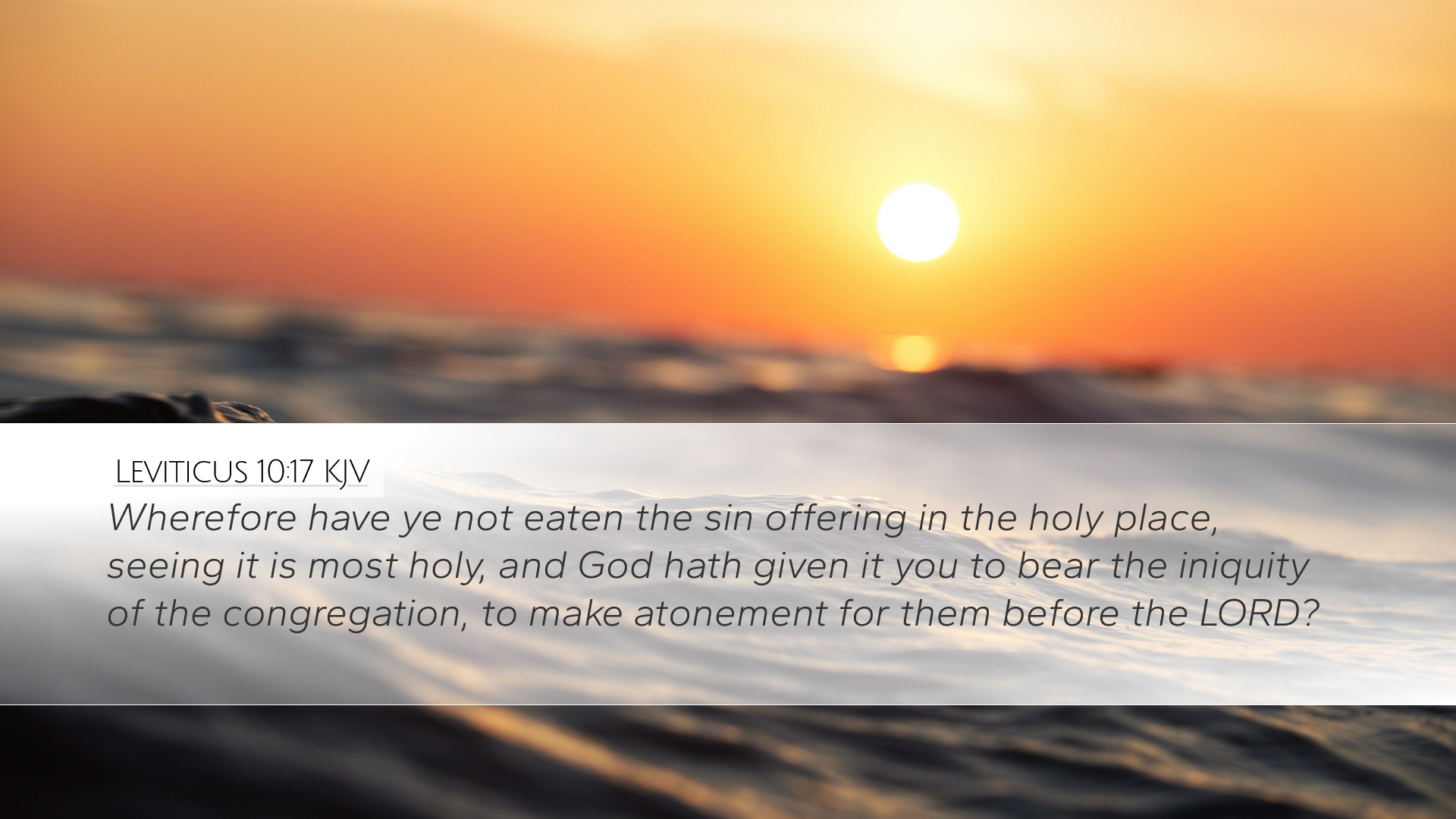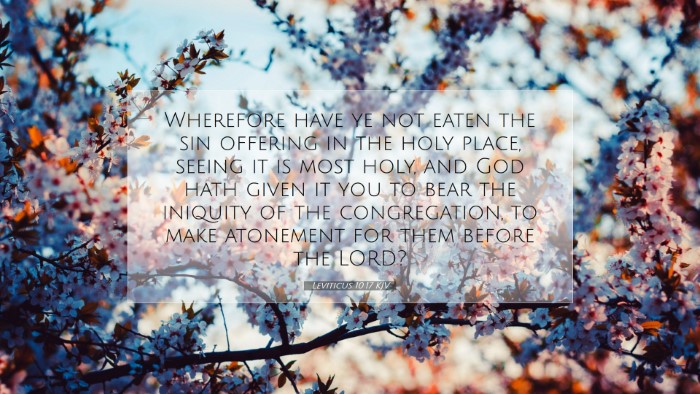Commentary on Leviticus 10:17
Verse: "Wherefore have ye not eaten the sin offering in the holy place, seeing it is most holy, and God hath given it you to bear the iniquity of the congregation, to make atonement for them before the Lord?" (Leviticus 10:17)
Introduction
This verse addresses a critical aspect of the responsibilities of the priests in the sacrificial system of ancient Israel. It emerges in the context of Aaron's sons, Nadab and Abihu, who suffered judgment for their unauthorized worship. It serves as a reminder of the sacredness of offerings and the serious nature of Ministry before God.
The Context
Leviticus 10 describes the severe consequences faced by Nadab and Abihu for offering strange fire before the Lord. This tragic incident highlights the necessity of reverence in worship and the importance of adhering to God's prescribed rituals. In light of these events, this verse emphasizes the need for proper observance of sacrificial rules.
Insights from Commentators
Matthew Henry
Henry emphasizes the significance of the sin offering as being most holy. He points out that these offerings symbolize atonement and the process by which the sins of the congregation are transferred onto the sacrifice. By not partaking in the sin offering, the priests undermined its purpose, which was to establish a means of reconciliation with God. Henry highlights the gravity of failing to obey divine instructions, urging that God's holiness should inspire profound respect and obedience.
Albert Barnes
Barnes elaborates further on the implications of disregarding the divine command regarding the consumption of the sin offering. He notes that the priests were to consume these offerings as a means of conveying their identification with the atonement they symbolized. The act of eating the offering was not merely a rite but also an expression of intimacy with God, suggesting the communal aspect of worship and forgiveness. Barnes stresses that this neglect reflects a failure to understand the nature of sacrifice as an essential means through which God provided for the moral and spiritual wellbeing of His people.
Adam Clarke
Clarke provides a historical context, reiterating that the sin offering was part of the atonement set by the Law. He argues that the consumption of the sin offering is not just a ritual but also a physical manifestation of participating in the sacrificial system, highlighting the priestly role in the mediation between God and the people. Clarke emphasizes that for Israel, offerings served as an essential relational mechanism with God, and neglecting this was tantamount to rejecting God's provided means for atonement. His commentary pushes for a recognition of the responsibility placed upon the priests to maintain the sanctity of such offerings.
Theological Implications
Leviticus 10:17 is layered with theological significance for both the Old and New Testaments. It illustrates the seriousness with which God regards holiness and obedience in worship. For pastors and theologians, this scripture serves as a focal point in discussions regarding the nature of sin, atonement, and the role of mediators in the faith community.
- The Holiness of God: Reflects the idea that God's presence demands respect and precise adherence to His directives.
- Understanding Atonement: Highlights the importance of recognizing how offerings served to bridge the gap between a holy God and sinful humanity.
- Ministry Responsibilities: Calls for leaders to uphold the standards set forth by God in their spiritual duties.
Practical Applications
This verse and its surrounding context offer profound lessons for contemporary ministry. Here are some practical applications:
- Importance of Obedience: Leaders must prioritize God’s commands in all aspects of ministry, ensuring that they don’t overstep the boundaries set by scripture.
- Valuing the Sacred: Those in service must treat worship and the elements involved as sacred and deserving of utmost reverence.
- Community Engagement: The tradition of atonement and reconciliation invites a commitment to lead congregations in understanding and living out the implications of Christ’s sacrifice.
Conclusion
Leviticus 10:17 invites reflection on the nature of holiness, sacrifice, and our responsibilities as ministers and believers. It underscores the importance of approaching God with the right attitude and respect for the processes He has instituted. In a time when worship can often become commonplace or diluted, this passage calls for a return to the fundamentals of reverence and obedience.


